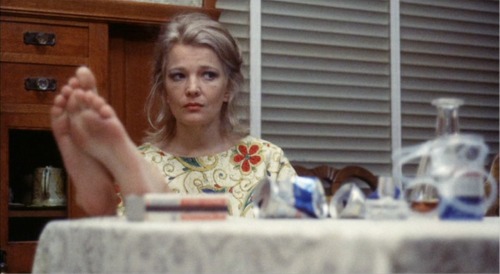A couple.
Originally aired on television as a six-part miniseries, Ingmar Bergman's "Scenes from a Marriage" is an epic chronicle of the on and off marriage between Johan (Erland Josephson) and Marianne (Liv Ullmann), two middle-aged professionals, and how their relationship, throughout the years, has transitioned from the superficial to the heavily conditional to the beautifully transcendental.
The film, which is Ingmar Bergman's highly intelligent and realistic examination of the complexity of modern marriage, is, so far, the most honest and thorough 'marriage' film that I've ever seen. And thanks to the neutral emotional reality that the film has presented, I was able to watch the film objectively and without any gender-related predilections. The film, after all, is never about some sort of war between sexes. What "Scenes from a Marriage" is in fact all about is the idea that giving up on a marriage doesn't necessarily mean that you're also giving up on love.
Sometimes, as what the film ironically and controversially suggests, to remove oneself from the conventions of a superficial marriage may result on love in a deeper context. Johan and Marianne, two romantic souls who initially thought that they have grown tired and contemptuous of each other and that they can be happy again in the arms of other people, have discovered, in a very hard way, that it's not each other that they are tired of but the mere shackles of their humdrum of a marriage; and that in the end, even though it's some other people they want, it's only each other that they truly need.
Highly unusual for Ingmar Bergman, "Scenes from a Marriage" never delves into visual and thematic profundity perhaps because its ideas are expressed not through stunning images and moods but through spoken words. Even Sven Nykvist, known for his masterful, almost dream-like approach to cinematography, takes on a more urgent and simple style for this one. After all, with this project, it was Bergman's utilitarian intent to reach a wider audience, and indeed, he has succeeded; so much that he was ultimately forced to change his telephone number so as to avoid countless random calls from couples seeking marriage advice.
As for the performances, it's but given for both Liv Ullmann and Erland Josephson (both Bergman regulars) to deliver multifaceted performances that are as incendiary as they are tender. And although by no means am I saying that both Ms. Ullmann and Mr. Josephson are unattractive (Ullmann is in fact one of the most luminous faces in all of cinema), they have both embodied the personalities of the married couple in a way that they wouldn't care less on how they would look in a dingy pajama or in a business attire. Unlike other 'marriage' films nowadays where actors are chosen based on their looks and how their face values would help in endearing the story to the audience, which almost always results in disastrous alienation, "Scenes from a Marriage" begs to differ. By presenting Johan and Marianne in a very non-special way, both physically and emotionally (they were even branded as 'emotional illiterates'), the audience, with its television success as withstanding proof, were able to connect easily with the couple in all their vulnerabilities and imperfections.
"Scenes from a Marriage", with its almost 3 hours running time, may prove to be quite infuriating to watch for some, especially because of the fact that it's a dialogue-driven, often visually static film. But do watch it for the performances, the energy and the insights. Believe me, it will be one of the most realistically introspective films you'll ever see about relationships and, ultimately, about love after marriage. This is Bergman channeling his inner marital therapist, and he does not disappoint.
FINAL RATING









